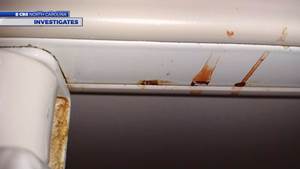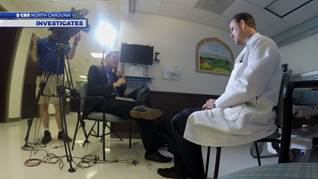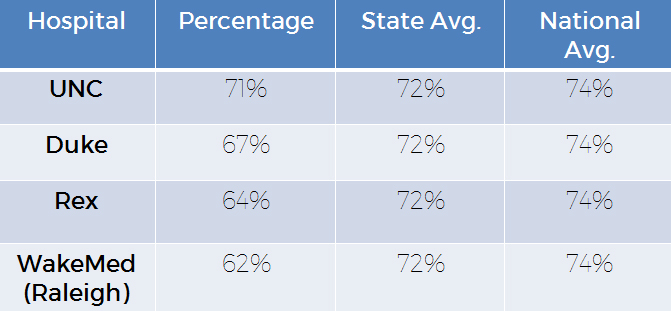RALEIGH, N.C. – A former WakeMed employee says some patients are being placed into dirty hospital beds.
“I noticed the blood on the stretcher that was obviously not from that patient,” said Jeff Johnson.

Johnson recently left his job as a nurse at WakeMed in Raleigh.
He said he witnessed patients being placed in transfer beds with dried up blood, vomit, and other bodily fluids.
“This is absolutely a health risk,” he said. “The crew is fantastic. They have some of the best doctors here. They’re being that this problem is taken care of, and nothing is being done.”
Johnson took 12 to 20 photos of the dirty beds every night he worked for a three-month period.
He gave CBS North Carolina Investigates more than 100 of those photos.
“A lot of blood, a lot of blood spots, a lot of blood drips and some areas where vomit had went down the side of the stretchers and it was just covered up with a clean sheet,” said Johnson.
CBS North Carolina went straight to the hospital for answers.
“To our knowledge patients have not been placed in these beds, said Dr. West Paul, senior vice president and chief quality and medical staff officer.

But Paul said it is a problem they are actively monitoring.
“Interestingly enough, we’ve known about some of these issues since at least since 2015 and we’ve had a task force working on this,” said Paul. “We’re not perfect yet, we’re striving for it, and we’re going to get there.”
Johnson did not provide any pictures of patients in the beds, which would violate federal HIPPA laws, but told CBS North Carolina he’d often notice the dirty beds after a patient was already placed in them.
“I can’t say that it absolutely did not happen, but if it did, as soon as we found out that would be taken care of and taken care of relatively quickly,” said Paul.
Johnson said the dirty beds could put employees in embarrassing situations.

“It’s embarrassing to tell them ‘Hey can you get up? The bed’s dirty.’ You kind of do what you can to switch things out without embarrassing yourself and the hospital,” said Johnson.
Paul said once a month, each bed is taken apart and thoroughly washed. They are then tagged to let staff know they’ve had that cleaning.
“We have implemented several systems before and during this employee’s tenure, that terminally cleans the beds and checks at least three times between each patient to make sure their appropriately cleaned,” said Paul.
Johnson was removing the tags from the beds, which he was asked not to do.
“These tags are just to make sure we terminally clean them on a routine basis, not that they’re clean at the time,” said Paul.
“I couldn’t believe it,” said Johnson, “Who cares if they were cleaned if they’re not clean to put a patient in right now,” he said.

“Yes, can there be defects in that? Yes. But when they are caught we immediately pay attention to those and clean them before patients are put in,” said Paul. “We are probably one of the best in the industry now at doing this,” he added.
He said Johnson did the right thing by bringing the issue up but should also be part of the solution.
“It’s also the employee’s responsibility when they identify the issue. The thing they do is fix it themselves,” said Paul.
“I just figured it was an easy fix,” said Johnson “I went to my boss and then the higher up boss, and nothing was getting done,” he said.
Whether it’s in the ER or the OR, hospital beds are going to get exposed to blood and other fluids.
Paul said they have asked other hospitals about the problem.
“We have found it is a common problem, we’ve reached out to other hospitals and other systems and it is an issue,” said Paul.
While they won’t see eye-to-eye on how the issue is being addressed, both parties can at least agree that cleanliness has to be a priority.
“That’s what I’m in this profession for is to try and do the best I can for people,” said Johnson.
Paul said he could assure patients coming in they’re not going to get placed in a bed that are covered in blood or vomit.
“Perfection. I wish it were obtainable but if there is an issue and we identify it or the patient identifies it immediately it will be fixed,” he said.
Paul said while the beds should be clean, they also track infection rates when monitoring issues like these. He said the hospital’s infections rates have not been impacted by this problem.
CBS North Carolina looked to see if there was an outside agency that would check for cleanliness.
Hospital Consumer Assessment of Healthcare Providers and Systems is a national survey that asks patients about their experiences during a recent hospital stay.
Results are given to the federal Centers for Medicare and Medicaid Services. The survey did not ask about beds specifically, but did ask about overall bedroom and bathroom cleanliness.
Here are results from the most recent survey data collected in 2014:Patients who reported that their room and bathroom were “Always” clean

Source: HCAHPS
Search for a hospital here.
When asked about the scores, UNC Hospital provided a statement saying:
“UNC Hospitals is a major academic medical center with more than 800 beds that treats patients from across the state. Our rooms are thoroughly cleaned by our housekeeping team and are also sanitized with ultraviolet disinfection machines. We are proud of our high HCAHPS score related to patients’ perception of cleanliness, but we are constantly striving for improvement.”
REX Healthcare in Raleigh provided the following statement:
“There is one HCAHPS score that measures patients’ perceptions about how often their rooms and bathrooms are cleaned. That is important, but if you’re analyzing cleanliness, the most important factor is preventing infections. At UNC REX Healthcare, we are proud of our low infection rates, which are the result of high-quality room and equipment cleaning, hand hygiene, correct antibiotic use and many other efforts. We are continually improving our processes to prevent infections, and enhance patients’ safety and overall satisfaction.”
As of Thursday evening, WakeMed and Duke have not provided a statement.



